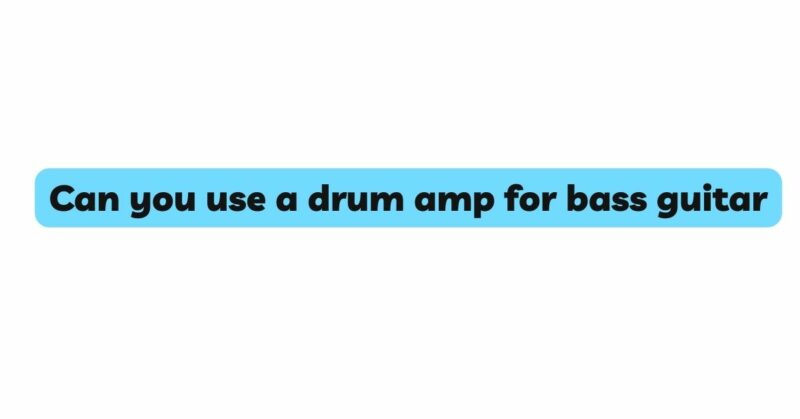In the world of music, the boundaries between instruments and their amplification are often challenged, leading to innovative sonic landscapes. When it comes to amplification, the question arises: Can you use a drum amp for a bass guitar? This article delves into the intriguing realm of musical experimentation, uncovering the potential, challenges, and creative prospects of using a drum amplifier to amplify the resonant tones of a bass guitar.
Understanding Drum Amplifiers and Bass Guitars
Before exploring the concept of using a drum amp for a bass guitar, it’s crucial to understand the fundamental characteristics of both instruments and amplifiers. Drum amplifiers, also known as drum monitors, are engineered to capture and project the intricate nuances of percussion instruments, including drums and cymbals. These amplifiers prioritize clarity, definition, and accurate sound representation to assist drummers in live performances and rehearsals.
Bass guitars, on the other hand, produce deep, low-frequency tones that serve as the foundation of the musical arrangement. Bass amplifiers are specifically designed to reproduce and enhance the low-end frequencies produced by bass guitars, providing a solid and resonant backbone to the music.
The Idea of Using a Drum Amp for Bass Guitar
The concept of using a drum amplifier for a bass guitar raises intriguing possibilities. Technically, it is possible to connect a bass guitar to a drum amplifier using the appropriate cables and connectors. However, this unconventional approach introduces several considerations, including frequency response, tonal characteristics, and sound quality.
Drum amplifiers are designed to emphasize the mid-range frequencies of percussion instruments, which can differ significantly from the low-frequency characteristics of a bass guitar. This distinction in frequency response can impact the overall sound projection and tonal balance when using a drum amplifier for a bass guitar.
Frequency Response and Tonal Balance
One of the primary challenges of using a drum amplifier for a bass guitar is the difference in frequency response. Bass guitars generate deep and resonant low-frequency tones that require amplification systems capable of accurately reproducing these frequencies. Drum amplifiers, while adept at capturing mid-range frequencies, may not provide the same level of clarity and definition in the low-end range.
When using a drum amplifier for a bass guitar, you may encounter a lack of depth and warmth in the bass tones, as well as potential distortion or muddiness. Adjusting the amplifier’s equalization settings may help mitigate some of these challenges, but achieving the ideal tonal balance can be a complex endeavor.
Sound Projection and Amplifier Power
Another consideration is the sound projection and amplifier power required for a bass guitar. Bass guitar amplifiers are engineered to handle the power and dynamics of low-frequency tones, ensuring that the bass tones remain clear and punchy even at high volumes. Drum amplifiers, while capable of projecting sound, may not offer the same level of power or efficiency in handling bass frequencies.
Using a drum amplifier for a bass guitar may result in inadequate sound projection, especially in scenarios that demand powerful and punchy bass tones. The amplifier’s ability to accurately reproduce the low-end frequencies of the bass guitar is crucial for maintaining the integrity of the musical arrangement.
Tonal Adaptations and Equalization
To optimize the use of a drum amplifier for a bass guitar, tonal adaptations and equalization adjustments are essential. Experimenting with the amplifier’s tone controls, such as bass, mid, and treble settings, can help tailor the sound to better match the characteristics of the bass guitar.
However, it’s important to note that equalization adjustments can only go so far in compensating for the amplifier’s inherent limitations in handling bass frequencies. While you may achieve a certain level of tonal improvement, the drum amplifier may not provide the same depth and resonance as a dedicated bass amplifier.
Creative Experimentation and Artistic Expression
Despite the challenges and limitations, using a drum amplifier for a bass guitar can also lead to creative experimentation and unique sonic outcomes. Some musicians intentionally seek unconventional sound textures that deviate from traditional norms. In such cases, the tonal characteristics of a drum amplifier can add a distinct color to the bass guitar’s sound, contributing to a one-of-a-kind sonic identity.
Musicians who wish to explore this avenue should approach it with an open mind, embracing the unexpected tonal qualities that arise from combining two different types of amplification systems.
Conclusion
In conclusion, while it is technically possible to use a drum amplifier for a bass guitar, there are significant challenges and considerations to take into account. Drum amplifiers are optimized for capturing mid-range frequencies and may not accurately reproduce the low-end tones of a bass guitar. The differences in frequency response, tonal balance, and sound projection can result in tonal imbalances, distortion, and inadequate sound projection.
Using a drum amplifier for a bass guitar may be suitable for experimental and unconventional soundscapes where unique textures are valued. However, for scenarios requiring clear, powerful, and resonant bass tones, investing in a dedicated bass amplifier remains the more appropriate choice.
Ultimately, the decision to use a drum amplifier for a bass guitar should be guided by the specific context, artistic vision, and desired sonic outcome. As musicians continue to push the boundaries of traditional sound, the exploration of unconventional amplification methods adds a layer of innovation and creativity to the ever-evolving world of music.


